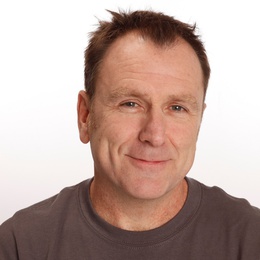
Even though Brooklyn-born Colin Quinn is a New Yorker through and through, he has a soft spot for Philadelphia; he affectionately characterizes the city as being “like a prison, in the sense that everybody there will fight. … I know it’s crazy, but it’s got a spirit.” He returns to Philadelphia this month for two shows at the National Constitution Center, “Colin Quinn Unconstitutional,” on Saturday, October 26, at 7:30 p.m. and 10 p.m.
“Unconstitutional” features Quinn’s thoughtful, laugh-out-loud and, of course, ribald observations on the creation of America’s most important political document. He also delves into the evolution of politics and political leaders, and attempts to explain why reality TV personalities such as the Kardashians rather perfectly embody the American dream.
Quinn began his on-screen career with MTV game show “Remote Control,” an experience he recalls as “like being on spring break at all times,” though not an exceptionally lucrative one, having earned a paltry $100 per show even at the show’s peak of popularity. He later went on to join the cast of “Saturday Night Live,” perhaps best known for his acerbic “Weekend Update” segments. His body of work also includes appearances in films such as “A Night at the Roxbury” and “Grown Ups.”
In addition to performing, he has also become a prolific writer. (“I’m Irish,” he says. “It’s what we do—we talk and we write and we internalize.”) We sat down with Quinn to discuss the upcoming appearances in Philly and a litany of other topics, from Charlie Sheen to the pitfalls of Communism to Quinn’s dreams of playing in the National Basketball Association.
Suburban Life: When did you develop an interest in history?
Colin Quinn: I didn’t; I just stink at science and math. I had no aptitude in things like science and math, so I had to stick to things where I could read the language and understand it. The truth is, I’m not that interested in history.
My whole life, no matter what kind of mentality people had—left, right, whatever it is—everyone agreed that the Constitution was brilliant. I didn’t get it, so I started really thinking about it, and now I feel like I get it. When I started writing [the show], I was like, “Oh my God, it made our personalities and who we are, for the best reasons and the worst reasons.” It’s because of that document that we all want our individual rights. It also makes the rest of the world want to stand up and make something of themselves. The bad part is that it’s not a collective mindset; it’s a very selfish mindset, in that it basically says, “I want to get mine. Beat it, and get out of my way.” There’s no unity of country, no collective. … Communism is a great example of one of those things that sounds great because it makes it seem like everybody is equal, but the brilliance of our Founding Fathers was in the fact that they knew that people have a streak of self-interest, and they understood that people were corrupted by power. They were self-aware.
SL: What can people expect from your upcoming shows at the Constitution Center?
CQ: They can expect a show about what’s going on now, not just the Constitution. It’s one of those pieces where I talk about the psychology of America and how we got to where we are. … September 11, [2001] is one example of a time when our country was united, and that lasted all of six months. It was the only time in my lifetime when the country had the unity that other countries had. I was just in Toronto, and that’s a great social experiment. Canadians really do have more of a collective personality, for better and for worse. We’re like Charlie Sheen, and they’re like Emilio Estevez; nobody talks about Emilio Estevez, but he looks damn good. Charlie Sheen might have made more money, but you have to imagine there have been a few times when Charlie has gone to Emilio asking for a couple of bucks.
SL: How was your time on “SNL”?
CQ: It was good and bad, like any other job, and it was still the most amazing experience of my life. It doesn’t mean it was perfect. Everyone wants their dreams to be real, and it’s still the most amazing thing having been part of that show. My other dream was to play for the NBA; I was, like, 12 years old. My friends told me, “You were good, but you were washed up at 13.” I peaked at 12.


